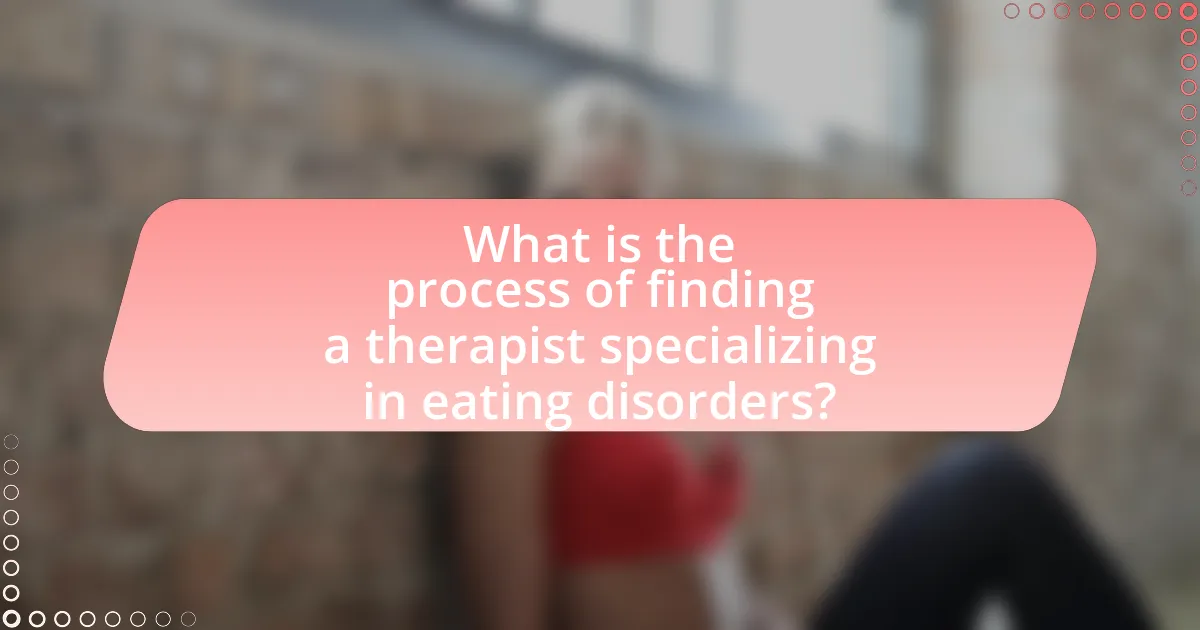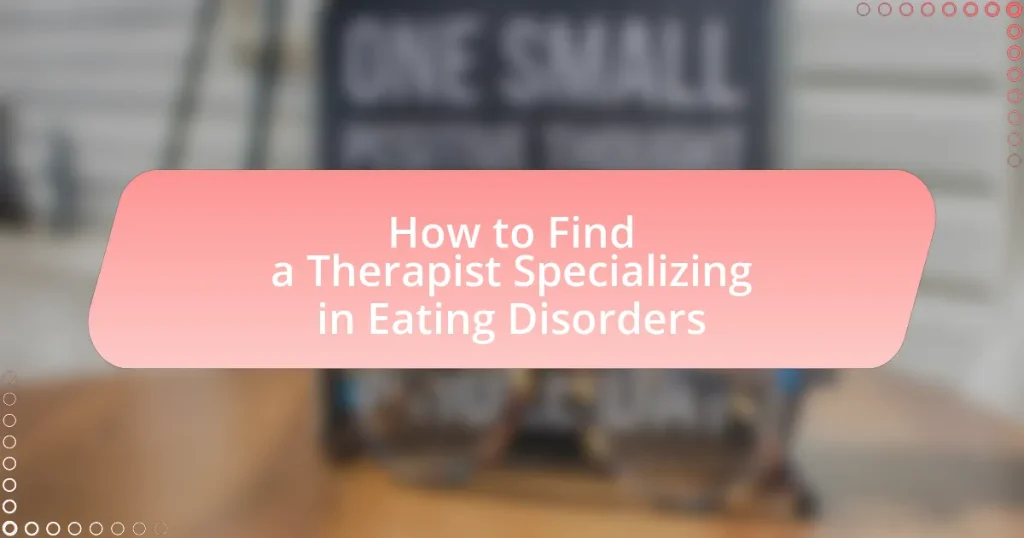The article focuses on the process of finding a therapist specializing in eating disorders, outlining essential steps such as researching qualified professionals, verifying credentials, and assessing compatibility through initial consultations. It emphasizes the importance of selecting therapists with specific training in eating disorders and discusses various therapeutic approaches, including Cognitive Behavioral Therapy (CBT) and Family-Based Therapy (FBT). Additionally, the article highlights the significance of logistical considerations like location, availability, and insurance coverage, while providing guidance on evaluating potential therapists and preparing for therapy sessions to enhance treatment outcomes.

What is the process of finding a therapist specializing in eating disorders?
The process of finding a therapist specializing in eating disorders involves several key steps. First, individuals should research and identify licensed mental health professionals who have specific training and experience in treating eating disorders. This can be done through online directories, such as the National Eating Disorders Association (NEDA) or Psychology Today, which provide lists of qualified therapists.
Next, individuals should verify the therapist’s credentials, ensuring they are licensed and have relevant certifications in eating disorder treatment. It is also beneficial to read reviews or testimonials from previous clients to gauge the therapist’s effectiveness and approach.
After narrowing down potential therapists, individuals should schedule initial consultations to discuss their specific needs and assess the therapist’s compatibility with their treatment goals. This step is crucial as it allows individuals to determine if they feel comfortable and understood by the therapist.
Finally, individuals should consider logistical factors such as location, availability, and insurance coverage to ensure that the chosen therapist is accessible and affordable. Following these steps can significantly enhance the likelihood of finding a suitable therapist for eating disorder treatment.
How do I identify the right type of therapist for eating disorders?
To identify the right type of therapist for eating disorders, seek professionals who specialize in this area, such as licensed psychologists, dietitians, or counselors with specific training in eating disorders. Research shows that therapists with expertise in cognitive-behavioral therapy (CBT) or dialectical behavior therapy (DBT) are particularly effective in treating these conditions. According to the National Eating Disorders Association, a therapist should have credentials such as being a licensed mental health professional and experience in treating eating disorders. Additionally, consider their approach to therapy, ensuring it aligns with your needs, whether that be a focus on nutrition, emotional support, or behavioral change.
What qualifications should I look for in a therapist specializing in eating disorders?
A therapist specializing in eating disorders should have a relevant advanced degree, such as a Master’s or Doctorate in psychology, counseling, or social work. Additionally, they should possess specialized training in eating disorders, which may include certifications from recognized organizations like the National Eating Disorders Association or the Academy for Eating Disorders. Experience in treating eating disorders is crucial, as evidenced by a minimum of two years of clinical practice focused on this area. Research indicates that therapists with these qualifications are more effective in providing appropriate care, as they are equipped with the necessary skills and knowledge to address the complexities of eating disorders.
How can I determine if a therapist has experience with my specific eating disorder?
To determine if a therapist has experience with your specific eating disorder, directly inquire about their qualifications and experience related to that disorder. Ask the therapist about their training, the number of clients they have treated with your specific eating disorder, and their approach to treatment. Research shows that therapists who specialize in eating disorders often have specific credentials, such as certifications from organizations like the International Association of Eating Disorders Professionals (iaedp) or the Academy for Eating Disorders (AED), which can indicate their expertise in the area.
What are the different types of therapy available for eating disorders?
The different types of therapy available for eating disorders include Cognitive Behavioral Therapy (CBT), Dialectical Behavior Therapy (DBT), Family-Based Therapy (FBT), and Interpersonal Therapy (IPT). CBT focuses on changing negative thought patterns and behaviors related to food and body image, while DBT incorporates mindfulness and emotional regulation strategies. FBT involves the family in the treatment process, particularly effective for adolescents, and IPT addresses interpersonal issues that may contribute to eating disorders. Research indicates that these therapies can significantly improve outcomes for individuals with eating disorders, as evidenced by studies showing that CBT can lead to a reduction in symptoms and improved psychological well-being.
How does cognitive-behavioral therapy (CBT) help with eating disorders?
Cognitive-behavioral therapy (CBT) helps with eating disorders by addressing the negative thought patterns and behaviors that contribute to disordered eating. CBT focuses on identifying and challenging distorted beliefs about body image, food, and self-worth, which are common in individuals with eating disorders. Research indicates that CBT is effective in reducing symptoms of eating disorders, with studies showing that approximately 50-70% of patients experience significant improvement after treatment. This therapeutic approach equips individuals with coping strategies and skills to manage their emotions and behaviors related to eating, ultimately promoting healthier eating habits and body image.
What role does family-based therapy play in treating eating disorders?
Family-based therapy (FBT) plays a crucial role in treating eating disorders by actively involving family members in the recovery process. This therapeutic approach, particularly effective for adolescents with anorexia nervosa, empowers families to support their loved ones in restoring healthy eating patterns and addressing underlying emotional issues. Research indicates that FBT leads to higher recovery rates compared to individual therapy, with studies showing that approximately 50-70% of adolescents achieve full recovery after completing FBT. The involvement of family members helps to create a supportive environment, which is essential for sustained recovery and reduces the likelihood of relapse.
Why is it important to find a therapist who specializes in eating disorders?
Finding a therapist who specializes in eating disorders is crucial because they possess the specific knowledge and skills necessary to effectively address the complexities of these conditions. Specialized therapists understand the psychological, emotional, and physical aspects of eating disorders, which enables them to provide tailored treatment plans that are more likely to lead to recovery. Research indicates that individuals receiving treatment from specialists in eating disorders show significantly better outcomes, including reduced symptoms and improved quality of life, compared to those treated by general mental health professionals.
How can specialized therapy improve treatment outcomes for eating disorders?
Specialized therapy can significantly improve treatment outcomes for eating disorders by providing tailored interventions that address the unique psychological and behavioral aspects of these conditions. Evidence shows that therapies such as Cognitive Behavioral Therapy (CBT) and Dialectical Behavior Therapy (DBT) are effective in reducing symptoms and promoting recovery. For instance, a study published in the Journal of Eating Disorders found that CBT led to a 50% reduction in binge-eating episodes among participants, demonstrating its efficacy in treating bulimia nervosa. Additionally, specialized therapists are trained to recognize co-occurring mental health issues, which can enhance overall treatment effectiveness. By focusing on individualized care, specialized therapy fosters a supportive environment that encourages patients to engage in their recovery process, ultimately leading to better long-term outcomes.
What are the risks of seeing a non-specialized therapist for eating disorders?
Seeing a non-specialized therapist for eating disorders poses significant risks, including misdiagnosis, inadequate treatment, and potential worsening of the disorder. Non-specialized therapists may lack the necessary training to recognize the complexities of eating disorders, leading to incorrect assessments and inappropriate therapeutic approaches. Research indicates that specialized treatment can improve recovery outcomes; for instance, a study published in the “International Journal of Eating Disorders” found that patients receiving care from specialized providers had higher recovery rates compared to those treated by general therapists. Additionally, without proper understanding of the medical and psychological aspects of eating disorders, a non-specialized therapist may inadvertently reinforce harmful behaviors or fail to address co-occurring mental health issues, further complicating the recovery process.
How can I start my search for a therapist specializing in eating disorders?
To start your search for a therapist specializing in eating disorders, begin by utilizing online directories such as the National Eating Disorders Association (NEDA) or Psychology Today, which allow you to filter therapists based on their specialties. These platforms provide verified information about therapists’ qualifications, areas of expertise, and client reviews, ensuring you find a professional suited to your needs. Additionally, consider seeking recommendations from healthcare providers or support groups, as they can offer insights into reputable therapists experienced in treating eating disorders.
What resources are available to help me find a qualified therapist?
To find a qualified therapist specializing in eating disorders, utilize resources such as the National Eating Disorders Association (NEDA) website, which offers a directory of treatment providers. Additionally, Psychology Today provides a searchable database of therapists, allowing users to filter by specialty, including eating disorders. The Substance Abuse and Mental Health Services Administration (SAMHSA) also offers a treatment locator tool that can help identify local mental health services. These resources are validated by their established reputations in the mental health community and their comprehensive listings of qualified professionals.

What should I consider during my search for a therapist specializing in eating disorders?
When searching for a therapist specializing in eating disorders, consider their qualifications, experience, and treatment approach. Qualified therapists should have relevant credentials, such as a degree in psychology or counseling, and specialized training in eating disorders. Experience is crucial; therapists with a history of working with eating disorder patients are more likely to understand the complexities involved. Additionally, inquire about their treatment methods, as evidence-based approaches like Cognitive Behavioral Therapy (CBT) have been shown to be effective in treating eating disorders. Research indicates that therapists who utilize a combination of therapeutic techniques tailored to individual needs can lead to better outcomes for patients.
How do I evaluate potential therapists for my needs?
To evaluate potential therapists for your needs, first identify your specific requirements, such as their specialization in eating disorders, therapeutic approach, and experience level. Next, research their credentials, including licenses and certifications, to ensure they are qualified to provide the necessary support. Additionally, consider scheduling initial consultations to assess their communication style, empathy, and understanding of your concerns. Studies indicate that a strong therapeutic alliance significantly impacts treatment outcomes, making it essential to feel comfortable and understood by your therapist.
What questions should I ask during the initial consultation with a therapist?
During the initial consultation with a therapist, you should ask about their experience and specialization in treating eating disorders. This is crucial because a therapist’s expertise directly impacts the effectiveness of the treatment. Inquire about their approach to therapy, including specific techniques they use for eating disorders, as this will help you understand if their methods align with your needs. Additionally, ask about their success rates with clients who have similar issues, as this can provide insight into their effectiveness. It is also important to discuss the frequency and duration of sessions, as well as their policies on confidentiality and communication outside of sessions, to ensure you feel comfortable and supported throughout the process.
How can I assess the therapist’s approach to treatment?
To assess a therapist’s approach to treatment, inquire about their theoretical orientation and specific techniques used in therapy. Understanding whether they utilize cognitive-behavioral therapy, psychodynamic therapy, or another method can clarify how they plan to address your needs. Additionally, ask about their experience with eating disorders, including any specialized training or certifications. Research indicates that therapists with specific training in eating disorders are more effective; for instance, a study published in the Journal of Eating Disorders found that specialized training significantly improves treatment outcomes. Finally, consider their willingness to collaborate with other healthcare providers, as a multidisciplinary approach often enhances treatment efficacy.
What factors should influence my choice of therapist?
When choosing a therapist, key factors include their specialization in eating disorders, therapeutic approach, credentials, and personal rapport. Specialization ensures the therapist has the necessary expertise to address specific issues related to eating disorders, which can significantly impact treatment effectiveness. The therapeutic approach, whether cognitive-behavioral, psychodynamic, or another method, should align with your preferences and needs for optimal engagement in the therapeutic process. Credentials, such as licensure and relevant training, provide assurance of the therapist’s qualifications and adherence to professional standards. Lastly, personal rapport is crucial; a strong therapeutic alliance can enhance trust and facilitate open communication, which are essential for successful therapy outcomes.
How important is the therapist’s location and availability?
The therapist’s location and availability are crucial factors in the effectiveness of treatment for eating disorders. Proximity to the therapist can reduce barriers to attending sessions, thereby increasing the likelihood of consistent attendance, which is essential for progress. Research indicates that individuals who can easily access their therapist are more likely to engage in therapy regularly, leading to better outcomes (American Psychological Association, 2020). Additionally, a therapist’s availability for appointments can significantly impact the therapeutic relationship; timely access to care can prevent crises and facilitate ongoing support, which is particularly important for individuals dealing with eating disorders.
What role does insurance coverage play in selecting a therapist?
Insurance coverage significantly influences the selection of a therapist by determining the affordability of therapy sessions. Many individuals prioritize therapists who accept their insurance to minimize out-of-pocket expenses, which can be substantial given the high costs associated with mental health care. According to a report from the National Alliance on Mental Illness, approximately 43% of adults with mental illness reported that cost was a barrier to receiving treatment. Therefore, understanding the specifics of insurance plans, including copays, deductibles, and in-network providers, is crucial for individuals seeking therapy for eating disorders. This financial consideration directly impacts the accessibility of specialized care, making insurance coverage a key factor in the decision-making process.
How can I ensure a good therapeutic fit with my chosen therapist?
To ensure a good therapeutic fit with your chosen therapist, prioritize open communication about your needs and preferences. Discuss your specific concerns, treatment goals, and any previous experiences with therapy during the initial sessions. Research indicates that a strong therapeutic alliance significantly enhances treatment outcomes, with studies showing that clients who feel understood and supported by their therapists are more likely to engage in the therapeutic process effectively. Additionally, consider the therapist’s experience and specialization in eating disorders, as this can directly impact the relevance of their approach to your situation.
What signs indicate that a therapist is a good match for me?
A therapist is a good match for you if you feel comfortable and understood during sessions. Comfort can manifest as an ease in sharing personal thoughts and feelings, indicating a safe therapeutic environment. Additionally, a good match is evident when the therapist demonstrates expertise in eating disorders, as shown by their qualifications and experience in this specific area. Research indicates that a strong therapeutic alliance, characterized by mutual respect and trust, significantly enhances treatment outcomes, particularly in eating disorder therapy.
How can I address any concerns I have with my therapist during treatment?
To address concerns with your therapist during treatment, communicate openly and directly about your feelings and thoughts. Initiate a conversation by expressing specific issues or discomforts you have experienced, as this fosters a collaborative environment for addressing your needs. Research indicates that effective communication between clients and therapists enhances treatment outcomes, as it allows for adjustments in therapeutic approaches tailored to individual concerns.

What are the next steps after finding a therapist specializing in eating disorders?
After finding a therapist specializing in eating disorders, the next steps include scheduling an initial appointment and preparing for the session. Scheduling allows for the establishment of a therapeutic relationship, which is crucial for effective treatment. Preparing for the session involves reflecting on personal experiences with eating disorders, identifying specific goals for therapy, and gathering any relevant medical history. This preparation enhances the effectiveness of the initial consultation, as it enables the therapist to tailor the treatment approach to the individual’s needs.
How can I prepare for my first therapy session?
To prepare for your first therapy session, gather relevant personal information and set clear goals for what you want to achieve. This preparation helps the therapist understand your background and tailor the session to your needs. Consider writing down your thoughts, feelings, and any specific issues related to your eating disorder that you want to discuss. Research indicates that clients who come prepared with specific topics tend to have more productive sessions, as they can communicate their concerns more effectively.
What information should I bring to my first appointment?
To your first appointment with a therapist specializing in eating disorders, you should bring your medical history, including any previous diagnoses and treatments related to eating disorders. Additionally, it is important to provide information about your current medications, any relevant family history of mental health issues, and a list of your symptoms and concerns regarding your eating habits. This information helps the therapist understand your situation better and tailor their approach to your needs.
How can I set goals for my therapy journey?
To set goals for your therapy journey, begin by identifying specific areas you want to improve, such as emotional regulation, self-esteem, or coping strategies related to your eating disorder. Clearly defined goals should be measurable, achievable, relevant, and time-bound, often referred to as SMART goals. For instance, instead of a vague goal like “feel better,” a SMART goal would be “attend therapy sessions weekly for three months to develop healthier eating habits.” Research indicates that goal-setting in therapy enhances motivation and accountability, leading to better outcomes in treatment (Lock & Le Grange, 2013, “Eating Disorders: A Comprehensive Guide”).
What should I expect during the therapy process for eating disorders?
During the therapy process for eating disorders, individuals can expect a structured approach that typically includes assessment, goal setting, and various therapeutic techniques. Initially, therapists conduct a comprehensive evaluation to understand the individual’s eating behaviors, emotional triggers, and underlying psychological issues. This assessment informs the development of a personalized treatment plan aimed at addressing specific needs.
Therapy often involves cognitive-behavioral techniques to challenge and change harmful thought patterns related to food and body image. Additionally, sessions may include nutritional counseling to promote healthy eating habits and restore a balanced relationship with food. Regular progress reviews are common, allowing for adjustments to the treatment plan as needed.
Research indicates that effective therapy for eating disorders can lead to significant improvements in psychological well-being and eating behaviors, with studies showing that cognitive-behavioral therapy has a success rate of approximately 50-70% in treating conditions like anorexia and bulimia.
How often should I attend therapy sessions for effective treatment?
For effective treatment, attending therapy sessions once a week is generally recommended. This frequency allows for consistent support and progress monitoring, which is crucial in addressing eating disorders. Research indicates that weekly sessions can lead to better outcomes, as they provide regular opportunities for patients to discuss challenges and develop coping strategies. A study published in the Journal of Consulting and Clinical Psychology found that individuals who attended weekly therapy sessions showed significant improvement in their symptoms compared to those who attended less frequently.
What are common challenges faced during therapy for eating disorders?
Common challenges faced during therapy for eating disorders include resistance to treatment, difficulty in discussing emotions, and the presence of co-occurring mental health issues. Resistance to treatment often stems from fear of change or a lack of motivation, making it hard for individuals to engage fully in the therapeutic process. Difficulty in discussing emotions can hinder progress, as many individuals with eating disorders may struggle to articulate their feelings or confront underlying issues. Additionally, co-occurring mental health issues, such as anxiety or depression, complicate the treatment process, as they can exacerbate eating disorder symptoms and create additional barriers to recovery. These challenges are well-documented in clinical literature, highlighting the complexity of treating eating disorders effectively.
What tips can help me make the most of my therapy experience?
To make the most of your therapy experience, actively engage in the process by being open and honest with your therapist. This transparency fosters a trusting relationship, which is essential for effective therapy. Research indicates that a strong therapeutic alliance significantly enhances treatment outcomes, particularly in addressing eating disorders. Additionally, setting specific goals for your therapy sessions can help maintain focus and track progress, as studies show that goal-oriented therapy can lead to better results. Regularly reflecting on your feelings and experiences outside of sessions can also deepen your understanding and facilitate meaningful discussions during therapy.


